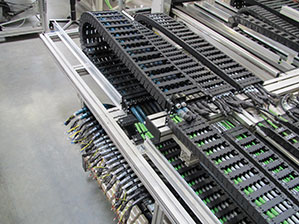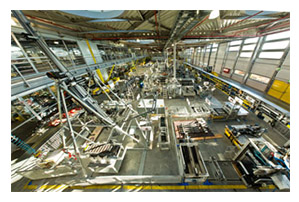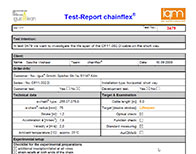igus® as a system supplier of "e-chains®" and "chainflex®" cables for use in the constantly moving energy supply systems has been operating an extensive test lab for over 20 years.
The chainflex® laboratory focuses particularly on tests and experiments that are absolutely necessary for determining the service life and operation of the moving cables, but not illustrated by the relevant standard norms and laboratories.
Read on...
There have been, and today there still are, a virtually infinite number of cable suppliers, who also sell cables for the "chain-suitable" area. But more often there arises for the customer the question of how far these cables are really appropriate for use and when a damage is to be expected. The commonly used experiments and tests stipulated in the standards meet the special requirements of customers only in the rarest of cases, since these specific applications simply cannot be described in terms of standards.
It is these customer requirements that the igus® laboratory prescribes. Beyond the standard norms or rules formulated by bodies such as VDE, UL and others, igus® has also created testing and manufacturing standards for the chainflex® cables, which meet the actual requirements of cables for the continuously moving area.
Thereby igus® fundamentally considers different tests and reviews:
1. Material testsNew materials for conductors, insulation or jackets are developed according to customers' requirement. Whereby apparent differences cannot be worked out at first sight particularly with the conductor and jacket materials. For this purpose, up to eight different chainflex® standards are used in the experiment.
2. Structural inspectionsHere, new superstructures, manufacturing processes and the related impacts on the service life are assessed systematically. In particular, these tests showed in the past that similar avoidable manufacturing processes can indeed lead to significant differences in the moving application.
3. In-process quality testsAfter the end of production and the standard tests customary for cable production, random cables are subjected to special igus® tests according to certain selection algorithms. Thereby, the lab tests up to 10% of all manufactured cables in the fatigue bending test and performs the necessary structure examinations.
4. Long-term service life testsThese test projects that need to be reckoned for up to 4 years, examine the actual maximum service life of the selected cables.
Here the focus on a continuous monitoring of the parameters is valid particularly to detect failure promptly.
5. Customer specific applicationsA special service is customer-specific testing according to the igus® standard.
These tests are based on the customer-specific movement sequences of the application and in particularly critical operations, provide the significant advantage of defining the limits resulting from the tests, and potential optimizations are feasible before the start of large series production.
The chainflex® labIn order to implement the above-mentioned tests usefully, systematically and reproducibly, various conditions have to be met.
Besides the igus® test standards that define clear rules for the tests and ensure comparability, the necessary environment needs to be created. The comprehensive laboratory covers more than 2.750 m2 and offers these conditions:
For this purpose, about 50 different test stands and equipment can be used by the laboratory team. There are the most varied travels (from 0,3 m up to 120 m) to choose from and even reproduce hanging as well as horizontal applications.
The torsion test stands with 12 triflex® axes offer a variety of test possibilities and expand the torsion test program, which is rounded off by four different six-axis robot.
Used particularly for the development of materials are special test facilities for abrasion and media tests that test under much more real experimental conditions than the immersion and aging tests carried out in accordance with UL or VDE. These have significantly contributed to the igus® outer jacket materials becoming the specifically tailored materials for energy supply systems, guaranteeing the highest reliability.
Also, the often underestimated thermal effects on the moving cables can be traversed in temperature curves from -40°C to +60°C in a special refrigerated container equipped with a 7 m long axis.
This offers the significant advantage that testing does not have to rely on conventional VDE winding mandrel tests. Instead aging can be tested using a large variety of temperature curves in continuous motion.
As part of this testing, the 7 m-axis can be operated with different radii and chain types.
Naturally, it applies to all tests that the currently over 700 operating test cables are systematically and effectively documented. Because, these 700 test cables mean that approximately over 5000 measurement points must be constantly monitored.
The monitoring systems developed by igus® are used in this process. In addition to online monitoring, they ensure documentation with extremely high accuracy, allowing wear to be detected before a failure.
This early detection - without destructive testing - is especially important for being able to draw conclusions regarding any adaptations that may be necessary. Subsequently, every cable is broken down into its components according to specified procedures and examined in detail and documented.
Qualified specifications are stated for all chainflex® cables and thus offer a design safety to the user for his cable selection.
Currently more than 700 tests are running in parallel at the test laboratory covering 2.750 m2, the largest of its kind for testing flexible cables. Here you see a selection.
We would also like to test your application, just speak to us!



 Range of measuring system cables
Range of measuring system cables 



